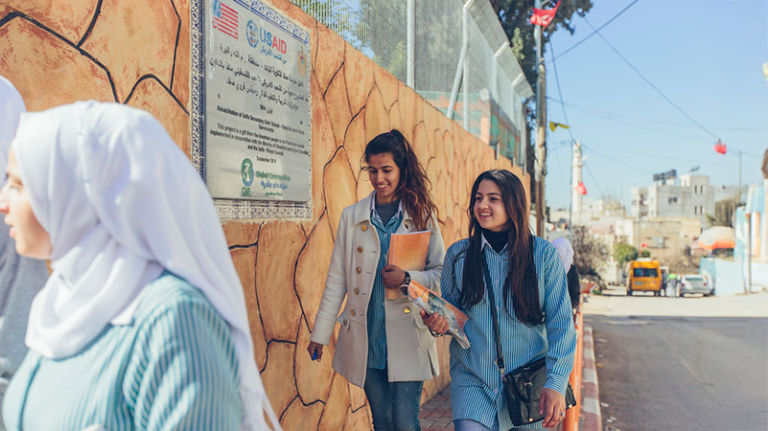
On his first day back in the White House, President Donald Trump made his opening moves to dismantle the fiscal and ideological foundations of American foreign aid programs. Executive Order 14169 of January 20, 2025, froze all existing foreign assistance programs, exempting only a few programs including military aid to Egypt and Israel. In the ensuing weeks, the Elon Musk-directed “Department of Government Efficiency” (DOGE) led the Trump administration’s termination of 90 percent of the US Agency for International Development’s (USAID) funding, or about $60 billion in foreign aid. DOGE also dismantled most of USAID, which is now being absorbed into the Department of State.
These policy shifts have had serious consequences, including in the West Bank of the occupied Palestinian territories, where the United States has long been an important aid donor. The United States has provided some $1 billion in assistance to the West Bank and Gaza between October 2023 and September 2024. It is important to note that the first Trump administration cut most USAID funds for the occupied territories, funds that were partly restored by the Biden administration as it took office in 2021. Critical infrastructure projects, social development programs, and the broader civic ecosystem helping Palestinians have been canceled. The rollback of aid threatens not only immediate humanitarian and development efforts but also the long-term prospects for Palestinian self-determination.
Development programs that had supported tens of thousands of Palestinians all lost US government funding.
Development programs that had supported tens of thousands of Palestinians across sectors such as education, vocational training, trauma rehabilitation, women’s entrepreneurship, disability inclusion, and other sectors all lost US government funding as well. For example, a $46 million water infrastructure project in Halhul was cancelled without warning, leaving aging pipes and unreliable access to clean water for Palestinians in the area. This is only one of many examples of how such abrupt policy reversals not only deepen economic hardship but further the unraveling of Palestinian stability.
Development programs in the West Bank have historically functioned as lifelines, particularly in regions where government institutions are absent. Funded largely through international aid, most notably USAID, these programs provided extensive services for the general Palestinian public. Numerous individuals who seek employment or struggle with disabilities and women attempting to enter the workforce depend on these development programs to support their families economically and lead more dignified lives.
The significance of these programs lay not only in service delivery but in the long-term potential they offered for Palestinian infrastructure development. Many projects functioned as incubators of local economic innovation and civic engagement, providing space for grassroots initiatives and cross-sector collaboration. The sudden loss of aid disrupted these institutional ecosystems during a time of already unstable and violent conditions ricocheting throughout Gaza and the West Bank. International partnerships between West Bank Palestinians and US-based academic and nonprofit institutions that were supported by US foreign aid dissolved, leaving critical development networks fractured and the citizens of the West Bank to further struggle in their difficult environment.
Governance in Gridlock: The PA and Paralysis
One of the most persistent barriers to sustainable infrastructure development in the West Bank is the dual bind of the Palestinian Authority’s (PA) political neglect and Israeli structural control. While international aid has temporarily filled critical service gaps, long-term infrastructure independence remains unattainable under current political conditions. The PA has consistently prioritized donor-backed urban centers, such as Ramallah, while neglecting underserved communities in Area C, which comprises over 60 percent of the West Bank and remains under full Israeli military and civil control. Despite chronic infrastructure deficits in Palestinian villages located in this zone, the PA has largely depended on Israel or international NGOs rather than assert development efforts of its own. This approach reflects not only the PA’s lack of legal jurisdiction but also its political strategy of maintaining security and economic coordination with Israel, often at the expense of marginalized Palestinian citizens.
The PA has consistently prioritized centers, such as Ramallah, while neglecting underserved communities in Area C.
For example, in many rural areas of Area C, access to basic infrastructure such as water and electricity remains absent or unreliable, and Palestinian attempts to build or repair wells, cisterns, or solar grids are often obstructed by Israeli occupation authorities under the pretext of lacking building permits. The PA has been unable to contest these demolitions or stop them, in effect leaving Palestinians at the mercy of military administration and foreign aid.
Economically, the West Bank remains structurally dependent on Israel. The PA does not control its own borders, imports, exports, or currency, and is therefore unable to support industrial or logistical infrastructure without Israeli cooperation. These layers of dependency reflect a uniquely manufactured crisis in international development–one in which the PA, though lacking full sovereignty, has actively collaborated in a system that prioritizes political survival and appeasement of foreign donors and Western powers over the needs of its people. The PA consistently aligns itself with security cooperation frameworks that sideline Palestinian national aspirations and everyday welfare.
In this context, development is not only stunted, it is selectively permitted. Israel tolerates donor-funded projects insofar as they do not threaten the political status quo or Israeli territorial control. The result is a landscape of abandonment, where Palestinians in rural areas, refugee camps, and parts of Area C find themselves without reliable infrastructure, denied access to basic services, and stripped of political representation.
With American foreign aid now essentially over in the West Bank for the foreseeable future, the few remaining development programs that serve as lifelines for Palestinian communities face possible collapse if it were not for some funding from the European Union and other donors. Still, the US cuts are very detrimental to these programs’ sustainability and, subsequently, Palestinians’ ability to remain on their land.
Furthermore, beyond the disruption of individual programs, the 2025 American aid cuts reflect a broader abandonment of US engagement in Palestinian development. USAID’s involvement in the West Bank has for many years gone beyond service provision; it has operated as a stopgap for basic human needs in a landscape where neither the Palestinian Authority nor the Israeli occupation forces has prioritized the well-being of Palestinian civilians. US-funded programs did not rebuild governance, but they helped Palestinians meet basic needs in spite of the political systems that failed them.
Rethinking Aid: Rights as a Framework
Restoring and protecting Palestinian development infrastructure requires urgent intervention. The United States must reauthorize funding streams that sustain Palestinian civil society—not in the name of state-building that props up elite actors, but to help preserve American interests in the region. The United States should be cognizant of the importance of youth employment, trauma recovery, disability access, and women’s livelihoods as agents for social stability in Palestinian society.
The few remaining development programs that serve as lifelines for Palestinian communities face possible collapse.
On the other hand, Palestinian civil society cannot remain hostage to the volatility of US politics. US-based NGOs, foundations, and the Palestinian diaspora should coordinate to build independent funding streams, capable of sustaining development programs when state actors falter. These non-state channels are increasingly critical to maintaining basic services and social resilience across the West Bank.
Finally, innovation in aid delivery is essential. Decentralized technologies such as blockchain platforms can offer greater transparency, bypass restrictive intermediaries, and empower Palestinians to reclaim ownership of their development trajectories. In a context of fragmentation and surveillance, local agency over aid is not just ethical, it is strategic.
The Stakes of Abandonment: Aid as a Moral Obligation
The 2025 rollback of US aid programs dealt a critical blow to the last standing pillars of Palestinian development in the West Bank. As infrastructure projects were abandoned and civil society initiatives shuttered, the result was not just humanitarian deterioration, it was the systematic disempowerment of an already dispossessed population. The Palestinians face a governance political vacuum. They are trapped between a weak and ineffective local authority and a foreign occupation that uniquely chokes economic, social, and political life.
Rebuilding the foundations of Palestinian development demands more than funding; it requires a complete rethinking of the aid model, one centered on human rights, political agency, and resilience against coercive external agendas. Without such an approach, the collapse of Palestinian civic space will not only deepen suffering, it will also foreclose the possibility of any future grounded in justice, dignity, or sovereignty.
The cost of inaction is geopolitical. A fragmented, abandoned, and economically immobile Palestinian society is a recipe for long-term instability, not only within the West Bank but across the broader region. Protecting Palestinian development infrastructure must therefore be treated not as an act of charity, but as a strategic imperative and moral obligation. The stakes are existential, for Palestinians and for the credibility of global commitments to self-determination. The collapse of aid is not only a policy failure, but a surrender of moral responsibility.
The views expressed in this publication are the author’s own and do not necessarily reflect the position of Arab Center Washington DC, its staff, or its Board of Directors.
Featured image credit: Flickr/USAID

